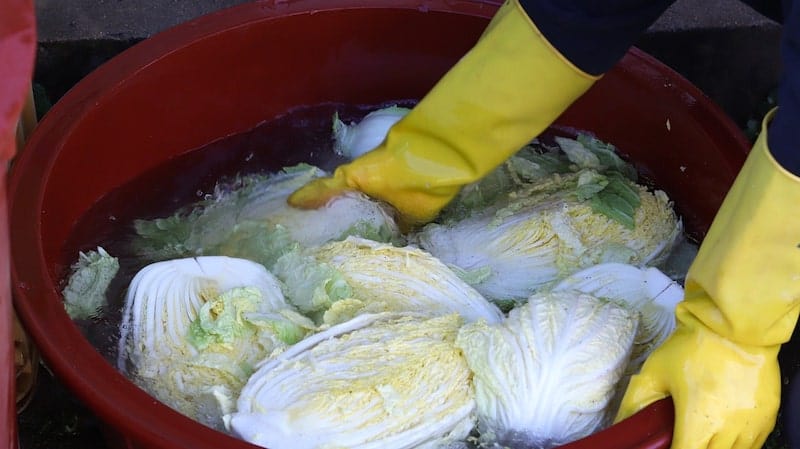Help! My Kimchi Is Not Fermenting! (Solved)
Kimchi is a traditional Korean dish that’s becoming increasingly popular around the world, and due to its strong flavor and health benefits, a lot of people make it themselves at home.
Although kimchi isn’t too hard to make, you may experience difficulties in the process. For example, you may think your kimchi is not fermenting.
In this article, I’ll explain the fermentation process, look at potential problems for your kimchi not fermenting, and discuss possible solutions to get your kimchi to ferment.
Reasons Why Your Kimchi May Not Be Fermenting
Before discussing the reasons for your kimchi not fermenting, let’s rewind and talk about kimchi’s history and tradition.
Kimchi has been a part of Korean cuisine for thousands of years. Since fermentation preserved vegetables before modern refrigeration methods, it represented an ideal way to extend the lifespan of food.
Throughout history, kimchi was fermented in ceramic jars or pots called ‘onggi,’ which were buried in the ground until the fermentation process was complete.
Today, you don’t have to bury your kimchi. Instead, you can let it ferment at room temperature or store it in your refrigerator. However, there are differences between the two.
The first important thing you need to do is put your kimchi in a clean, airtight jar. If your jar isn’t clean, bacteria like E. Coli or salmonella might develop and ruin the dish. If you don’t put your kimchi in an airtight jar, the fermentation process won’t be possible, and you risk spoilage.
Another reason why your kimchi may not be fermenting is it wasn’t left in the jar long enough. At room temperature, it takes about three to four days for kimchi to ferment. However, it takes about two to three weeks if it’s left in the fridge. So if you’ve left your kimchi in the refrigerator, and you opened it after two to three days, the process of fermentation probably hasn’t started yet.
Whether you leave it at room temperature or in the fridge depends on the taste you want to achieve. If you leave it at room temperature, the flavor will be milder. If you store it in the fridge, it will ferment for much longer, creating a sourer taste.
Although it may seem like your kimchi isn’t fermenting in the refrigerator, it probably is, only the process is much slower. If you want to speed up the fermentation, you can take your kimchi from the fridge and store it at room temperature.
Also, a lack of salt in your kimchi might be preventing it from fermenting.
If you’re making kimchi on your own, always pay attention to the amount of salt you add. If there isn’t enough salt, the fermentation process won’t start, or it will be much slower.

What to Do if Your Kimchi Isn’t Fermenting
If you’ve noticed your kimchi isn’t fermenting, the first thing to do is move it to an airtight jar. Before doing so, make sure there’s no mold in the kimchi, as this is a sign of spoilage.
If you’re keeping your kimchi in the fridge and it looks like it’s not fermenting, you can take it out and store it at room temperature. As mentioned above, this will speed up the process and allow kimchi to ferment much faster.
Once you’re satisfied with the taste of your kimchi, you can put it back in the fridge to slow down the fermentation process.
If it seems like your kimchi isn’t fermenting and it tastes bland, it might be due to the lack of salt. In this case, you can add more salt to the kimchi, and it should start fermenting in no time.
Lastly, have patience. If you’re keeping your kimchi in the fridge, it will take some time before it starts fermenting. But don’t worry, it’ll have an excellent and strong taste after a few weeks.
How Do You Know When Kimchi Is Fermenting?
There are several signs to establish if your kimchi is fermenting. The most obvious is bubbles. If you see bubbles in your kimchi jar, it means the fermentation process has started.
Furthermore, if your kimchi looks fizzy, it’s another sign of fermentation.
Once fermentation has started, there are a few things you could do to ensure you’re getting top-quality kimchi.
First, make sure you open the jar every day or every other day. Due to the fermentation process, pressure will build up inside the jar. If it’s tightly sealed, your jar might even break under pressure. That’s why it’s essential to open the jar every now and then to release this pressure.
Another thing you should do is stir your kimchi to keep it submerged in the liquid and make sure flavors are spread equally.
It’s also advisable not to overfill the jar with kimchi to leave it room to ferment. If you’ve noticed you have too much kimchi in the jar, you should take some out and put it in another jar.
The next big question is, how do you know if kimchi has fermented long enough? The answer is: There is no answer!
Everyone has different preferences when it comes to the taste of kimchi. If you’re making kimchi for yourself, you can decide on the length of the fermentation process. If you prefer a milder flavor, you shouldn’t ferment it for too long. If you enjoy the tangy, sour taste, you can ferment your kimchi for weeks.
During the fermentation process, don’t forget to smell your kimchi. If the smell is too sour or alcoholic, your kimchi might have gone bad.
If you purchased your kimchi from a store, you wouldn’t know how long it’s been fermenting for. Since kimchi is usually kept in fridges in supermarkets, the fermentation process is slow.
So, if you’ve bought kimchi and you don’t like the taste, you can let it sit on your counter until it achieves the desired flavor.
In Summary
If you’re making kimchi and don’t see any bubbles, I hope this article has been of help and provided possible causes and solutions to your kimchi not fermenting.
Although it may seem like a lot of work, fermenting kimchi isn’t that difficult. If you follow the basic guidelines, you will be left with a delicious, healthy dish that you can store in the fridge for months.
In the end, the length of fermentation depends only on you since you know your own tastes.







